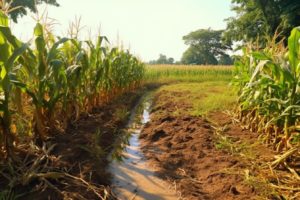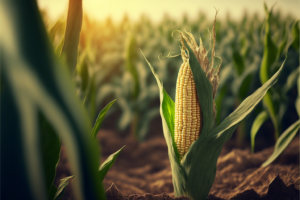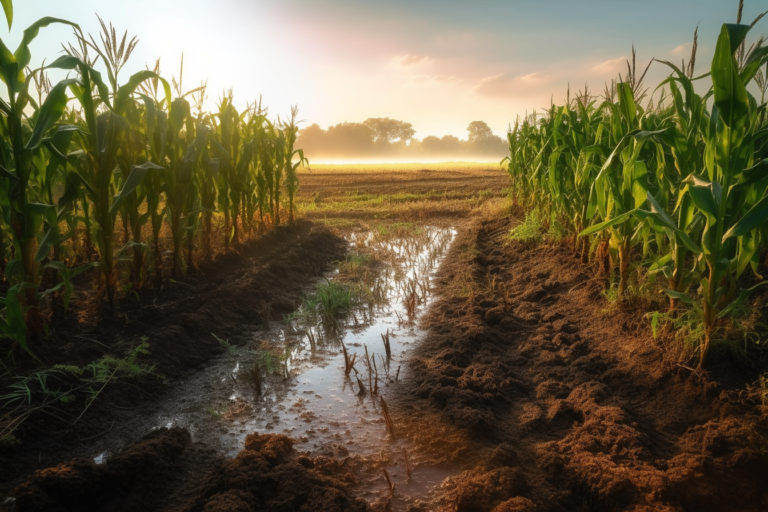We all know that growing corn can be an exciting and rewarding experience. However, to ensure a healthy and bountiful harvest, it’s essential to understand the proper watering techniques. In this article, we’ll dive into the critical question: How often should you water corn? By the end, you’ll have a clear understanding of the best practices for watering corn, ensuring a thriving and productive crop.
The Importance of Proper Watering
The Role of Water in Corn Growth
Water plays a crucial role in the growth and development of corn. It helps in the absorption of nutrients, transports essential elements throughout the plant, and aids in the process of photosynthesis. Without sufficient water, corn plants can suffer from stunted growth, poor yield, and even death.
Overwatering vs. Underwatering
Both overwatering and underwatering can have detrimental effects on your corn plants. Overwatering can lead to root rot, while underwatering can cause the plants to wilt and lose turgor pressure. Striking the right balance is vital for ensuring a healthy and productive crop.
Factors Affecting Water Requirements
Soil Type
Different soil types have varying water retention capacities. For example, sandy soil drains water more quickly than clay soil, meaning corn planted in sandy soil may need more frequent watering.
Weather and Climate
The weather and climate in your area will also play a significant role in determining how often you need to water your corn. Hot and dry climates require more frequent watering, while cooler and more humid environments may require less frequent watering.
Plant Age and Growth Stage
As corn plants grow and develop, their water requirements change. Young corn plants need less water, while more mature plants have higher water requirements, especially during critical growth stages like pollination and grain fill.
General Guidelines for Watering Corn
Watering Frequency
As a general rule of thumb, corn requires about 1 inch of water per week, either from rainfall or irrigation. In hot and dry conditions, you may need to increase this amount to 1.5 inches per week.

Deep and Infrequent Watering
It’s better to water your corn deeply and less frequently, as opposed to shallow and more frequent watering. Deep watering promotes the development of a robust root system, which helps the plant withstand drought and other stresses.
Monitoring Soil Moisture
Regularly checking the soil moisture can help you determine when it’s time to water your corn. The soil should be moist but not saturated, as overly wet soil can lead to root rot and other problems.
Tips and Tricks for Efficient Watering
- Water in the early morning or late afternoon to reduce evaporation.
- Use a soaker hose or drip irrigation system to apply water directly to the root zone.
- Consider using mulch to help retain moisture in the soil.
- Monitor your corn plants for signs of stress, such as wilting or curled leaves, to help determine if additional watering is needed.
Recommended Watering Frequency for Corn During Different Growth Stages
As an expert, I recommend paying close attention to the frequency and amount of water used when watering your corn crop. The following recommendations should be followed to ensure the optimal growth and health of your corn plants at each stage of development:
Germination Stage:
The germination stage of corn is critical for the plant’s establishment. During this stage, corn requires frequent, yet minimal watering. Watering the corn bed once per day with about ¼ inch of water is sufficient.
Vegetative Stage:
During the vegetative stage, corn requires more water as it establishes its roots and grows new leaves. The frequency of watering should be increased to twice a week, with ¾ to 1 inch of water per week.
Tasseling and Silking Stages:
Tasseling and silking stages are important in corn grain formation. During this time, the corn no longer requires as much water as it did during the vegetative stage. The plants should be watered once per week with 1-1.5 inches of water.
Grain Filling Stage:
During the grain filling stage, the plants require high amounts of water to meet the demands of the growing ears. It is recommended to increase the frequency of watering to twice a week, with 1-1.5 inches of water per week. In drought conditions, the corn will require even more water.
Table of Recommended Corn Watering Frequency
| Growth Stage | Frequency of Watering |
|---|---|
| Germination | Once per day with ¼ inch of water |
| Vegetative | Twice a week with ¾ to 1 inch of water per week |
| Tasseling and Silking | Once per week with 1-1.5 inches of water |
| Grain Filling | Twice a week with 1-1.5 inches of water per week |
When watering corn, it’s important to water slowly and deeply so the roots can absorb as much water as possible. Over-watering should be avoided as it can lead to deprived oxygen in the root zone, which causes the plant to suffocate and become more susceptible to pests and disease.
By following these guidelines, you can ensure that your corn crop receives the proper amount of water at each stage of growth, leading to healthy plants and a bountiful harvest.
Best Time of Day to Water Corn
When it comes to watering your corn, there are a few things to keep in mind. One of the most important factors to consider is the best time of day to water your plants.
Here are some tips on when to water your corn to keep them healthy and thriving:

Water in the Morning
The best time to water your corn is in the morning. This is when the soil is still cool, and the plants have not yet been exposed to harsh sunlight. Watering in the morning also means that any excess moisture will evaporate during the day, which can help prevent diseases such as mold, blight, and mildew from forming.
Avoid Watering in the Evening
Avoid watering your corn in the evening. Watering late in the day can cause the leaves of the plants to stay wet overnight, which can increase the risk of fungal diseases. This is especially true in humid climates.
Use Drip Irrigation
Consider using drip irrigation instead of overhead watering. Drip irrigation allows water to be applied directly to the roots of the plants, which can help reduce water waste and disease.
Pay Attention to Soil Moisture
Make sure you are not overwatering your corn. Corn requires moist soil, but too much water can lead to problems such as root rot and nutrient leaching. Use a soil moisture meter or dig a small hole in the soil to check for moisture levels before watering.
Consider the Weather
Finally, it’s important to pay attention to the weather when deciding when to water your corn. If it has recently rained or the forecast calls for rain, you may not need to water your plants as frequently. On the other hand, during periods of hot and dry weather, you may need to water your corn more often to keep them healthy.
By following these tips, you can ensure that your corn plants get the water they need to grow strong and healthy, while avoiding common pitfalls that can lead to disease or other problems.
Conclusion
In conclusion, knowing how often to water corn is essential for a successful harvest. By considering factors such as soil type, weather, and plant growth stage, you can develop a watering schedule tailored to your corn’s specific needs. Remember to monitor soil moisture regularly, water deeply and infrequently, and employ efficient watering techniques to conserve water and promote healthy corn growth.
Frequently Asked Questions
How much water does corn need during the growing season?
Corn generally needs about 1 inch of water per week during the growing season. This amount may need to be increased during hot and dry conditions.
Can corn survive a period of drought?
Corn can tolerate short periods of drought Corn can tolerate short periods of drought, but prolonged lack of water can lead to reduced yields and even plant death. It's essential to monitor your corn plants and provide supplemental watering when necessary.
How can I tell if my corn plants are receiving enough water?
Regularly checking the soil moisture and observing your corn plants for signs of stress, such as wilting or curled leaves, can help you determine if they are receiving enough water. The soil should be moist but not saturated.
What time of day is best for watering corn?
The best time to water corn is in the early morning or late afternoon, as this reduces evaporation and ensures that the water reaches the root zone effectively.
Can I overwater my corn plants?
Yes, overwatering can cause problems such as root rot and reduced oxygen availability for the roots. It's important to strike the right balance between providing enough water and not overwatering your corn plants.

